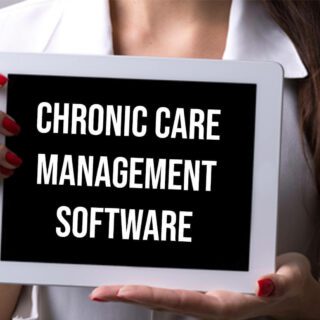
Remote patient monitoring is undoubtedly making a significant positive impact on healthcare delivery systems by increasing and enhancing fruitful communication between patients and providers. By leveraging the latest digital technologies and smartly integrating them with existing healthcare delivery models, RPM programs are inspiring efficiency in practices and bettering patient outcomes. 88% of healthcare providers are currently investing or are planning to invest in RPM devices which suggests the efficacy and advantages of RPM programs for all the stakeholders. It’s a proven fact that patients enrolled in an RPM program are better engaged and progress towards recovery faster than those who are not. Additionally, RPM is known to reduce disengagement and burnout rates in physicians who are often overburdened with the constant inflow of patients.
Remote patient monitoring is a relatively easy-to-use and convenient healthcare receiving system even for the old-aged, less tech-savvy patient population. Patients enrolled in an RPM program receive certain portable and wearable health-tracking devices as per their conditions necessitate which they can use to self-record vitals like their heart rate, blood sugar level, blood pressure etc and transmit their data electronically to their physicians and caregivers for medical evaluation. Patients can record their data from the comforts of their homes or on the go anytime and furnish it to their doctors for medical advice.
Care providers can conveniently access patient data anytime and anywhere for evaluation and send recommendations, treatment plans and emergency alerts, ensuring ongoing care and reduced hospital visits and complication chances. Similarly, care providers can tweak treatment and medication regimes and update existing programs to keep patients on track towards recovery and reassure their families by responding to emergency sensors and alerts of falls or accidents. Some of the most prominent and widely used RPM devices in the healthcare industry today are-
A blood pressure monitor is a very hassle-free device that is inflatable and squeezes the patient’s arm and monitors the reaction of their arteries and veins once it deflates to determine their blood pressure and heart rate.
Heart rate monitors are wearable devices that track and record a patient’s heart beats per minute during everyday activities, exercise and sleep for their physician to evaluate and accordingly suggest lifestyle changes and medications.
Pediatric RPM devices can go a long way in reducing clinic visits for children growing up with medical complications and keeping their childhood intact from constant disruptions. Parents can remotely record and transmit their child’s medical and behavioral data to caregivers and receive recommendations.
Pulse oximeters aren’t strange to anyone anymore owing to their widespread usage in the pandemic to detect lung function. These easy-to-use devices can be plugged on fingers or earlobes to detect blood-oxygen levels and pulse.
Keeping constant tabs on the weight of a patient suffering from congestive heart issues is vital in managing their condition. Smart scales allow patients to furnish their physicians with their updated weight from their homes and be protected from unprecedented aggravations.
Wearable sensors on a patient can record suspicious activity like falls and incidents and immediately alert their clinicians, family members and neighbors for timely intervention and medical assistance, preventing deaths or serious injuries.
ECG devices are smart handheld, wearable or sometimes even patch-form devices that can record electric impulses from a patient’s heart and transmit this information to their physician in real-time. ECG remote patient monitoring devices have proven to be critical in averting fatal mishaps occurring due to illnesses like myocardial ischemia, arrhythmia and ST depression. The real-time data transmission capabilities of these devices help physicians deliver urgent care and nip any issues in the bud for continued effective management of the illness.
It’s laborious for patients suffering from illnesses like atrial fibrillation and DVT to visit the testing lab every once in a while to provide their blood samples for medical evaluation. Old-aged patients are usually restricted in their movements and can’t regularly travel to provide their blood samples. Furthermore, it’s difficult for the general patient population to leave their work and secure childcare to show up at the testing lab. Anticoagulation testing devices come in handy for such patients as they can easily and remotely get their blood checked with just a single drop and furnish the report to their physician for critical analysis and treatment recommendations.
Diabetic patients require constant monitoring of their blood sugar levels for which regular clinic visits can prove to be non-viable and hassling. Using glucose meters to monitor blood sugar levels remotely can be a better alternative and keep physicians updated with the latest patient data for informed decision making and up-to-date treatment advice, leading towards better outcomes.
The pregnant patient population generally prefers lower clinic visits for low-risk pregnancies. If pregnant women can have virtual access to high-caliber medical assistance, their lives can be made easier and the entire prenatal process can become very enjoyable for them. Qualified nurses can remotely assist them by evaluating their vital healthcare data provided using RPM devices and attend to any emergencies for risk-free and successful pregnancies.
Remote patient monitoring devices can make the expensive, tedious and emotionally exhausting treatment processes very engaging, enjoyable and affordable for patients. Patients and their families can be assured of the effectiveness of the treatment with continuous, transparent communications with their providers and high-quality ongoing care and attention. In a nutshell, RPM devices can bridge the gap between constant patient needs and professional medical care resulting in improved outcomes and better disease management.
We at Health Wealth Safe are a reputable RPM solutions provider and offer free RPM devices like glucose monitors, heart rate monitors and weight cuffs to patients of physicians and healthcare providers partnering with us. If you are a healthcare provider wanting device support for your RPM program, consult HWS today.
Become a Partner
Join HWS
Support
Portals